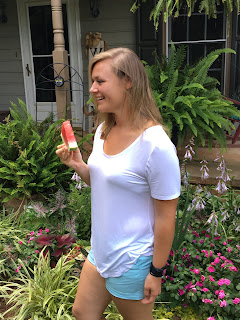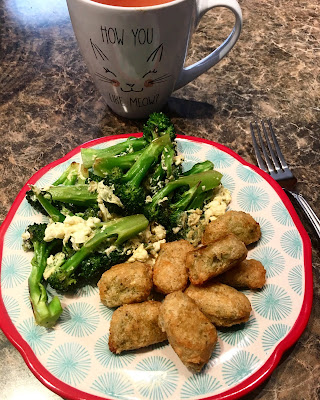Healthy Living 101
Happy New Year! This past year went by in the blink of an
eye. Are we all ready for a fantastic
and healthy 2018? This post may seem
super basic to some of you, but it never hurts to have a refresher of what our
bodies need. Before I go into the basics
for the average person, remember that every
body is different and has different needs. What works for me may not work for my best
friend, but these reminders are the absolute basics.
1.
Eat
fruits and vegetables.
This
one seems so simple yet many of Americans are not getting enough of them! Fruits and veggies are packed with tons of
vitamins, minerals, water, and
fiber. We need all these nutrients for
the metabolic process in our bodies,
and the fiber helps our digestion. Fiber
keeps us “regular”, if ya know what I mean. This is very important as it can help prevent diverticular disease. Interesting fact: Diverticular disease
generally begins with
diverticulosis, which is essentially pouches in your intestines. It
then can become inflamed from non-fibrous foods getting stuck in the pouches leading to diverticulitis. Untreated diverticulitis can lead to a number of things, including colon
cancer, which is the #3 cancer found in both
men and women. Eating fiber can help
push your food though the intestines quickly so minimal residue gets
stuck in those pouches.
Have a hard time eating fruits and veggies and want a tip? Eat the
ones you like! It is as
simple as that. If you can only tolerate
broccoli with cheese sauce,
then add cheese to your dish! Only like carrot sticks with ranch dressing? Go
ahead and use it. Be mindful when using
these added dips because they do
contain extra fat and calories, but if it helps you get the roughage down, do it! Try to get at least 3-5 servings of fruits and vegetables daily.
2.
Make
at least half of grains 100% whole grains.
This one may be difficult if you are
used to eating refined, white enriched
products; that is why the Academy of Nutrition and Dietetics recommends that half of your daily whole
grain intake be 100% whole grain. How do we know if we are eating 100%
whole grain? Read the nutrition label. The thing to keep an eye out for should be
“100% whole grain” as the first
ingredient.
Whole
grains are important because they contain a lot of B vitamins, which are essential for many metabolic
pathways in the body. They also contain fiber, which I mentioned before
being great for digestion. I challenge you to try and make half of you grain
servings whole grain today. The dietary guidelines recommend women get 3-6 servings of
whole grains daily. For men, it is recommended to consume 4-8
servings of whole grain.
3.
Add
in some healthy fats.
But
wait, fat makes you fat! WRONG!! This
could not be more far from the truth.
Our bodies need fat for producing hormones, transporting fat-soluble
vitamins, and helping the brain function—just to name a few. The body needs 2 essential fatty acids:
linoleic acid and linolenic acid.
Linoleic
acid is more commonly known as omega-6 fats which is found in vegetable oils,
nuts, and seeds. Linolenic acid is
omega-3 fats and is found in fish, walnuts, flaxseed, canola oil, and soybean
oils. These are polyunsaturated fats.
Monounsaturated
fats are great for the body too. These
fats are found in olive oil,
avocados, and nuts. Try to incorporate
these into your meals and snacks in
moderation. Fatty foods are high in
calories so we do not need to eat
as many of them because they provide satiety.
4.
Exercise.
Ah, yes. This is one of my favorite things to
emphasize! I believe diet is just as important, especially
since I am a registered dietitian and spent many
years studying nutrition. However, you
cannot do one without the other! Americans are known for living sedentary
lifestyles and developing heart
disease and diabetes. Guess what? These diseases can be prevented by diet and
exercise.
How can we make it a part of our
lifestyle? The biggest tip I can give you is do something you enjoy and can stick
with it. It can become hard in the craziness of life, but it can be
done. Scheduling time for exercise is
the best way to meet your goals. It takes 21 days to build a habit, so try it
and see how it works! Check out my blog on “Being Active with a Busy Schedule” for more
tips.
5.
Drink
Water.
After
all, our bodies are at least 60% water.
It is important that we replenish
our bodies with water because we lose a lot of it when we use the bathroom, sweat, and breathe. Drinking 64 ounces every day can help ensure we are getting enough water.
Be weary of extra beverages like
soda, juice, and alcohol. They are all full of empty calories and sugar
that do nothing for our bodies except add energy—energy
that we do not need. If you like
drinking these, use them sparingly. If you are a coffee drinker, do not exceed 4
cups (because of the caffeine
levels), and be careful with all of the added sugars. Coffee acts as a dehydrator for our body, so drink extra water if you do choose coffee.
Having said all of this, I am also an avid believer in enjoying life, and one of those pleasures is food. Enjoy special treats on occasion--it is ok! Your body can handle it. Just make sure that you incorporate healthful options in your diet on the regular.
I hope my take on "Healthy Living 101" helps some of you as you begin your journey in 2018. If you have any further questions or topics you would like me to blog about, comment down below or on Facebook. Share this post to spread the news!








Comments
Post a Comment